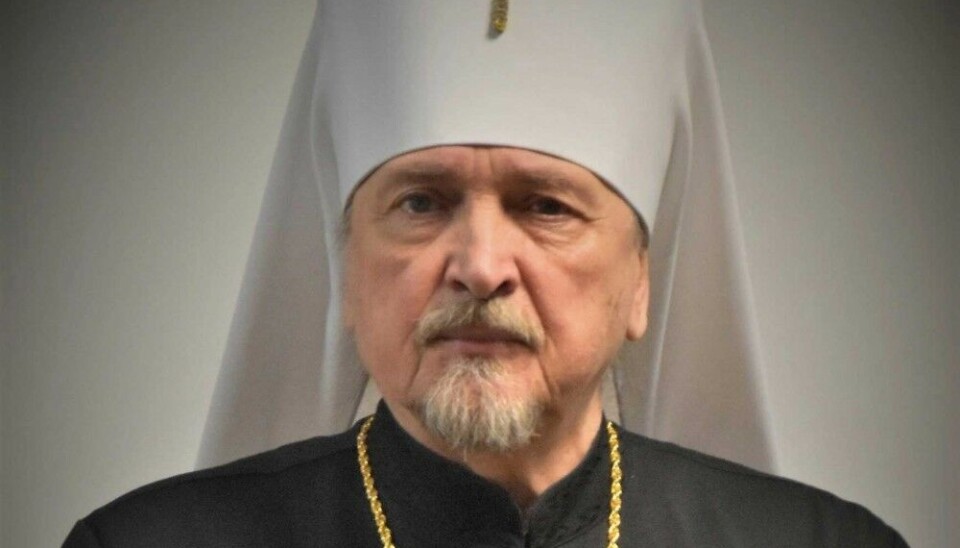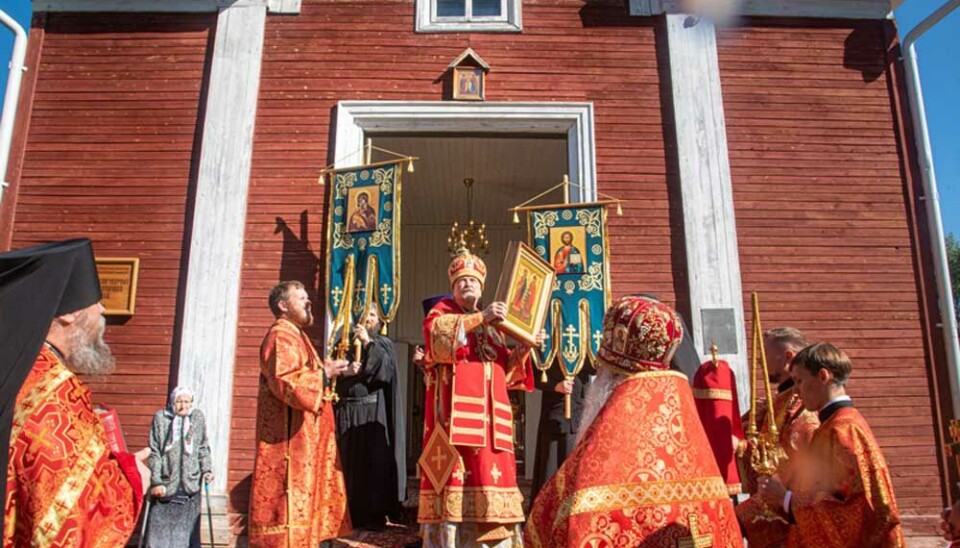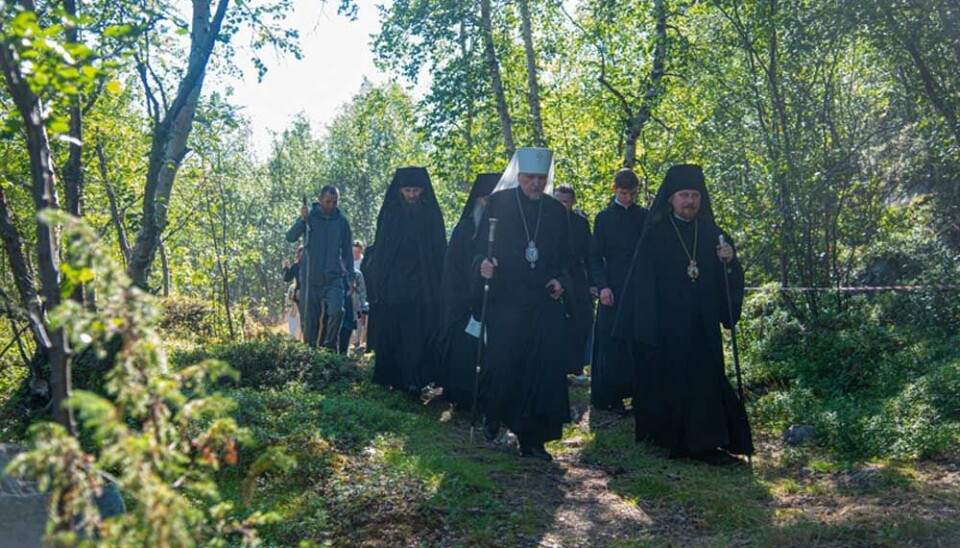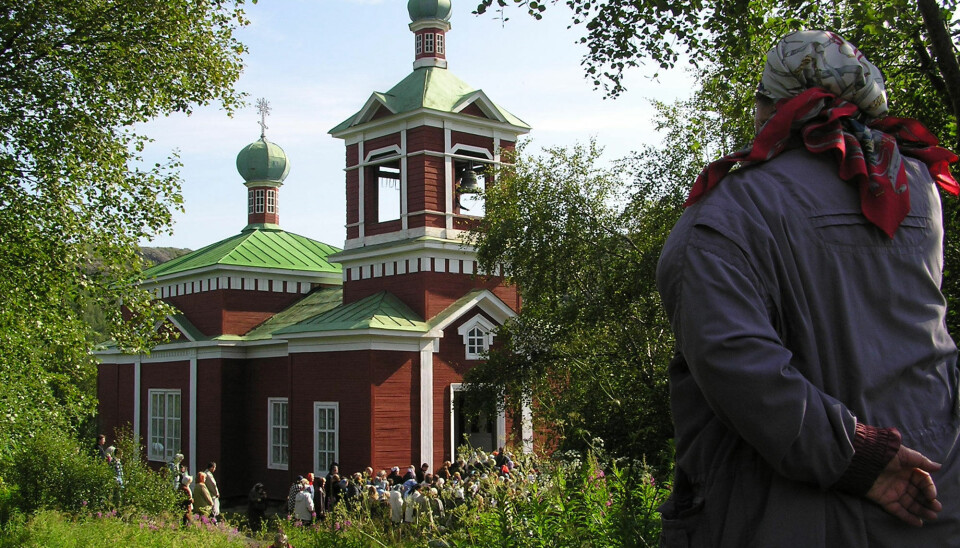
"The world has taken up arms against us," combative Murmansk church leader Mitrofan says during visit to NATO border
In an address delivered in the Church of Boris and Gleb, only few hundred meters from the border to Norway, the Metropolitan of Murmansk told a tale about Russia being under attack and its warriors in Ukraine only seeking peace and love.
“This is our vanguard in the Northwest. Here we stand, and here we will remain standing. Do you understand that, everybody?” the controversial chief prelate said during his visit to Borisoglebsk, the small piece of Russian land located on the western shore of the Pasvik River.
Mitrofan is making it a tradition to pay a visit to Borisoglebsk in early August in connection with the annual church celebration of the two Orthodox saints. Like last year, he arrived to the Russian-Nordic borderland together with a group of his most trusted prelates, among them Bishop Tarasii of Severomorsk.

With his country at war and his church a staunch supporter of the onslaught, Mitrofan is using his visits to Borisoglebsk as opportunity to lash out against the West and the Nordic neighbours.
The border to Norway is located only few hundred meters away and Finland - only few kilometres.
According to Mitrofan, the countries on the other side of the border represent “the world that has taken up arms against us.”
It is not Russia that is the aggressor, the prelate ardently argued. On the contrary, the Russian warriors in Ukraine are only seeking to bring “peace and love” to their Ukrainian brethren, he maintained.
The 11th Century saints of Boris and Gleb are exploited by Mitrofan and the Russian church as illustration of relations between Russia and Ukraine.
The two brothers were sons of Vladimir, Prince of Kyivan Rus, and are believed to have been killed by their brother Sviatopolk, who subsequently became ruler in Kyiv. Boris and Gleb were later sanctified by the Church.
According to Mitrofan, the two saints refused to take up arms against their brother. “They would rather die than fight their brother,” he explained.
In Mitrofan’s perverted narrative, it is the Russians that are the victims, not the Ukrainians. And like Boris and Gleb, the Russians are ready to give their lives for a common land.
“With joy, we observe how our [Russian] warriors are examples of this kind of love for their opponents. The opponents hate you, mock you and kill you. But we act in the opposite way.”
Similarly, he described the Russians as decent and the Ukrainians as villains.
“They do not accept the idea about love between brothers as embodied by Boris and Gleb. If we are all Christians, then why this kind of hatred? Where does it come from and why does it aggravate?
It is far from the first time that Mitrofan lays out his extreme views to churchgoers.
Few weeks after Russian forces launched their full-scale invasion of Ukraine and Mitrofan still believed in the conquest of Kyiv, he explained how Russia faces a big task in Ukraine.
“We now see how hard it will be to heal the country [Ukraine], how hard it will be de-nazificate the country, remove the infection, the fascism that now holds everyone in fear as hostages, and nobody dares to open their mouth for fear, because they will all be killed, tortured, and people are disappearing, mass graves are discovered by our advancing forces.”
According to Mitrofan, atrocities like the ones committed by Ukrainian authorities “were not even seen in Germany during the fascists.”
As it became clear that Russia is not winning the war, the ultra-conservative metropolitan argued that Russian warriors are fighting against ‘Anti-Christ’ and the “Prince of Darkness” and warned against apocalypse.
The Boris and Gleb Church was built in 1873 and stands on the site of a chapel originally built by Russian Orthodox monk and missionary Trifon in the 16th Century. It is the only piece of Russian land situated on the western bank of the Pasvik River.
When the border between Tsarist Russia and the union state of Sweden-Norway was delineated in 1825, the Russian negotiators demanded that the Boris and Gleb Church and surrounding land should belong to Russia. In return Norway got a far bigger territory on the eastern side of the river.
The Borisoglebsk area is part of the Russian border zone and only people with special permission are allowed to visit the church.

















